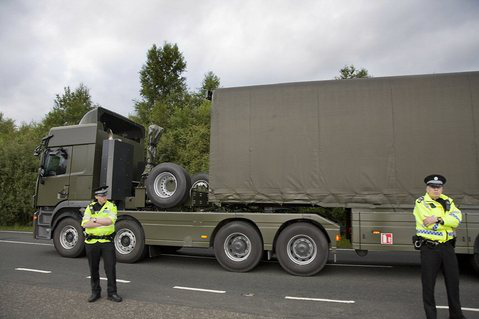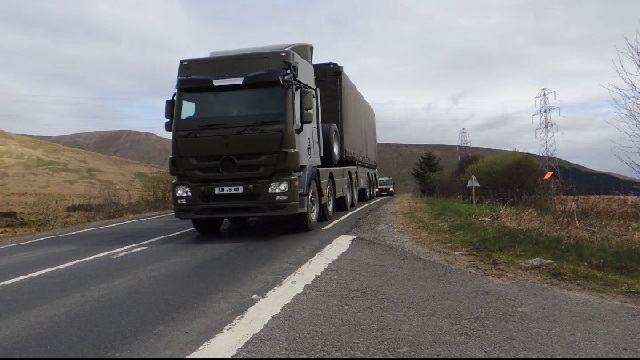As many as 22 nuclear warheads were transported from England to Scotland in eight road convoys during 2020 despite coronavirus restrictions, according to a new report by campaigners.
Another bomb convoy arrived at the Royal Naval Armaments Depot at Coulport in Argyll on 15 January and set off south to the nuclear weapons factory at Burghfield in Berkshire on 20 January during a ban on non-essential travel.
Nukewatch, which monitors the convoys, accused the UK Ministry of Defence (MoD) of taking “disregard for public safety to a new low”. Critics and politicians questioned whether the convoys were essential.
The MoD insisted, however, that the movement of nuclear materials was vital for national security and that convoys were “in line with all relevant regulations”.
A historic United Nations treaty banning nuclear weapons came into force on 22 January 2021 after being signed by 51 countries. It is supported by the Scottish Government, but opposed by the UK Government.
Convoys comprising 20 or more vehicles regularly transport Trident nuclear warheads by road between Coulport and Burghfield for maintenance and upgrades. They are tracked and filmed by activists, and often travel close to Glasgow, Edinburgh, Newcastle, Manchester and Birmingham.
The Ferret reported in May 2018 that safety problems plaguing the convoys had risen to a record high. The total number of incidents logged by the MoD over ten years was 179.
In its latest annual summary Nukewatch reported a total 27 convoy movements in the UK during 2020. Eight of those carried loads north from Burghfield to Coulport – with a “best estimate” they comprised 22 warheads.
Fewer warheads – estimated at nine – were transported south from Coulport to Burghfield. This was probably because the MoD was delivering upgraded warheads to Coulport, Nukewatch said.
The group recorded one convoy trip to Coulport and back to Burghfield in May 2020 when it said restrictions on non-essential travel were still in force in Scotland. The most recent convoy in January took place despite similar restrictions, it added.
Nukewatch also pointed that two convoys suffered breakdowns and had to make unscheduled stops on their way to Scotland in 2020. One was on the slipway of the M1 at the Kegworth interchange in Leicestershire on 20 June, and the other was at junction 48 of the A1(M) in North Yorkshire on 8 July.
Jane Tallents from Nukewatch criticised the MoD for ignoring lockdown travel bans. “We call on the MoD to suspend these non-essential movements at least while the Covid restrictions are at this high level,” she told The Ferret.
“The emergency plans for dealing with a serious accident while transporting nuclear weapons always looked inadequate to us. But travelling while all our hospitals are near to being overwhelmed by the pandemic is taking the MoDs disregard for public safety to a new low.
“The resources are just not available to organise an evacuation and tell people to take shelter near to the site of a radiation leak from a damaged warhead in transit especially in any of the high population areas they travel through.”
Tallents pointed to evidence that the warhead convoy often broke down. “We are told to trust their safety record with nuclear weapons but it appears they can’t even manage to keep their vehicles roadworthy,” she said.
The Nuclear Information Service, which researches nuclear weapons, also urged the MoD to stop bomb convoys during Covid restrictions. “I can’t see any reason for the convoys to happen during lockdown,” said the group’s director, David Cullen.
“I’m sure there’s enough leeway in the programme to work around the restrictions if they wanted to. There’s no way drivers and security staff can maintain safe distances within the convoy vehicles.”
He added: “The government owes Scotland an explanation, and I’d like to see them release the risk assessment they used to justify this.”

The Scottish Greens also disputed whether the bomb convoys were essential. “It is deeply irresponsible to have weapons of mass destruction on our roads, especially at the moment,” said Green MSP, Mark Ruskell.
“They increase the risk of being targeted by terrorist groups, and although the likelihood of a catastrophic incident remains slim, the implications of a safety breach would be horrific and impossible to contain.”
The Ministry of Defence declined to discuss the details of individual convoys, but stressed that it was following all national health guidelines. “All movements are carefully planned to minimise disruption to the civilian emergency services,” it said.
An MoD spokesperson stated: “Moving nuclear materials is an essential operation for maintaining the deterrent and protecting our national security.
“We prioritise the safety and security of the public at all times and movements are always conducted by highly trained personnel in line with all relevant regulations.”
Photos thanks to Nukewatch.














